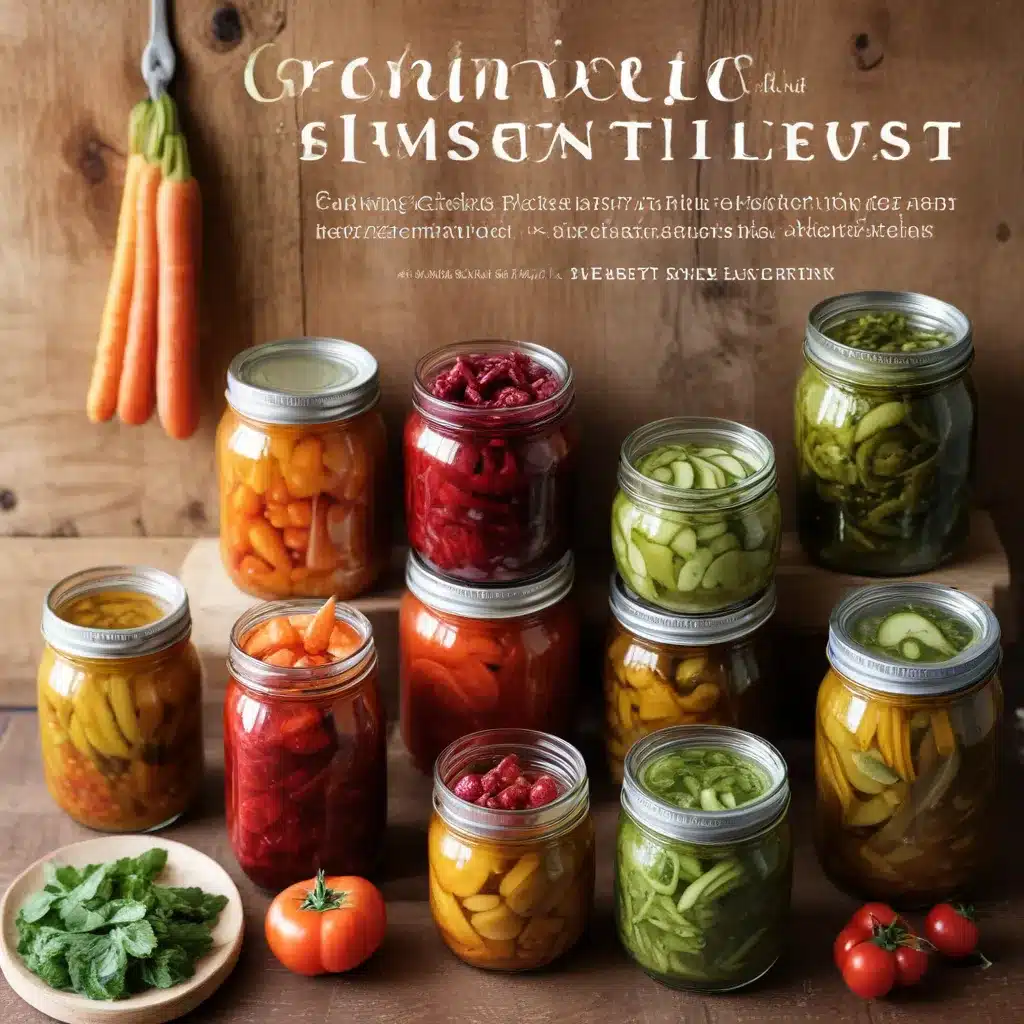
Whether you’re an avid gardener or simply love wholesome, homemade foods, preserving the harvest is a rewarding way to enjoy the fruits (and vegetables!) of your labor year-round. At Crooked Pines Farm, we employ a variety of preservation techniques – from classic canning to the centuries-old arts of pickling and fermentation – to transform our seasonal bounty into delicious, shelf-stable pantry staples.
Canning for Long-Term Storage
When it comes to preserving the harvest, canning is perhaps the most well-known and widely-used method. By sealing foods in airtight jars and subjecting them to high heat, the canning process kills harmful microbes and enzymes, locking in freshness for months or even years. There are two primary canning techniques:
Hot Water Bath Canning
This method is ideal for high-acid foods like tomatoes, pickles, jams, and fruit preserves. The jars are submerged in a boiling water bath, which heats the contents to a temperature that destroys potentially dangerous bacteria.
Pressure Canning
For low-acid foods such as vegetables, meats, and some fruit, pressure canning is the safer choice. The sealed jars are heated to higher temperatures under pressure, ensuring complete sterilization.
Canning Safety: Proper technique is crucial when canning to prevent the growth of botulism-causing bacteria. Always follow tested recipes, use the correct processing times, and ensure a complete, tight seal on each jar. When in doubt, err on the side of caution and throw it out!
Pickling Perfection
Pickling is another excellent way to preserve your garden’s bounty. Unlike canning, which relies on heat, pickling utilizes an acidic brine to inhibit microbial growth and maintain food quality.
Quick Pickles
For a simple, refrigerator-friendly option, try quick pickles. These require minimal prep – just submerge your veggies in a vinegar-based brine, add any desired seasonings, and let them sit in the fridge for a few weeks. Quick pickles preserve the vibrant colors and crisp textures of fresh produce.
Fermented Pickles
On the flip side, fermented pickles undergo a longer, anaerobic process. By immersing vegetables in a saltwater brine, you encourage the growth of beneficial lactic acid bacteria that naturally preserves the food. Fermented pickles develop a complex, tangy flavor profile and boast probiotic benefits.
Pickling Ingredients: When pickling, use a high-quality, distilled white vinegar or apple cider vinegar. Avoid table salt, which can contain anti-caking additives – opt for pure kosher salt or sea salt instead. For extra flavor, experiment with herbs, spices, and aromatics like garlic, dill, or chili peppers.
The Magic of Fermentation
While canning and pickling rely on acidity to inhibit spoilage, fermentation harnesses the power of beneficial microbes to transform and preserve foods. This ancient technique has experienced a modern resurgence, and for good reason – fermented foods are not only delicious, but also nutritious!
Lacto-Fermentation
At its core, lacto-fermentation involves submerging vegetables in a saltwater brine. The naturally-occurring lactic acid bacteria in the produce convert sugars into lactic acid, creating an anaerobic, acidic environment that prevents the growth of harmful microbes.
Vegetable Fermentation
Kraut, kimchi, pickles, and other fermented veggies are teeming with probiotics that support gut health. To get started, you’ll need a few key pieces of equipment: a fermentation crock or wide-mouth mason jars, an airlock lid or weight to keep the vegetables submerged, and a cool, dark storage space.
Fermenting Essentials: When fermenting, use pure, unrefined salt and purified water. Avoid chlorinated municipal water, which can inhibit the growth of beneficial bacteria. Monitor your ferments closely, watching for telltale signs of successful fermentation like bubbles and a pleasantly sour aroma.
Preserved Harvest Recipes
Now that we’ve covered the basics of canning, pickling, and fermentation, let’s dive into some of our favorite preserved harvest recipes – from canned tomatoes to fermented kimchi!
Vegetable Recipes
For a delicious taste of summer all year round, try our Canned Tomatoes – perfect for sauces, soups, and stews. Our Pickled Peppers make a zesty, versatile condiment, while Fermented Sauerkraut is a gut-healthy, probiotic powerhouse.
Fruit Recipes
Looking to preserve your orchard’s bounty? Opt for Canned Peaches, Pickled Apples, or a batch of tangy, spicy Fermented Kimchi.
Condiment Recipes
Home-canned Salsa, Pickled Relish, and Fermented Hot Sauce are not only flavorful, but also make thoughtful, homemade gifts.
Nutrition and Storage
Preserving the harvest doesn’t just extend the life of your produce – it can also enhance its nutritional value. Canning, pickling, and fermentation all help to concentrate vitamins, minerals, and other beneficial compounds, while also introducing probiotic cultures that support gut health.
Nutritional Benefits
Canning helps to retain the vitamins and antioxidants in fruits and veggies, while fermentation actually increases the bioavailability of certain nutrients. Pickled foods are also a great source of probiotics, which are crucial for proper digestion and immune function.
Proper Storage
To maximize the shelf-life of your preserved goods, it’s essential to follow food safety guidelines. Maintain cool, dark storage areas with consistent temperatures and minimal humidity. Properly sterilize all jars, lids, and equipment, and pay close attention for any signs of spoilage, such as off-odors, discoloration, or mold growth.
Whether you’re an experienced preserver or just starting your canning, pickling, and fermentation journey, Crooked Pines Farm is here to guide you. Harness the power of the seasons and transform your garden’s bounty into delicious, nutritious pantry staples that will nourish your family all year round. Happy preserving!


